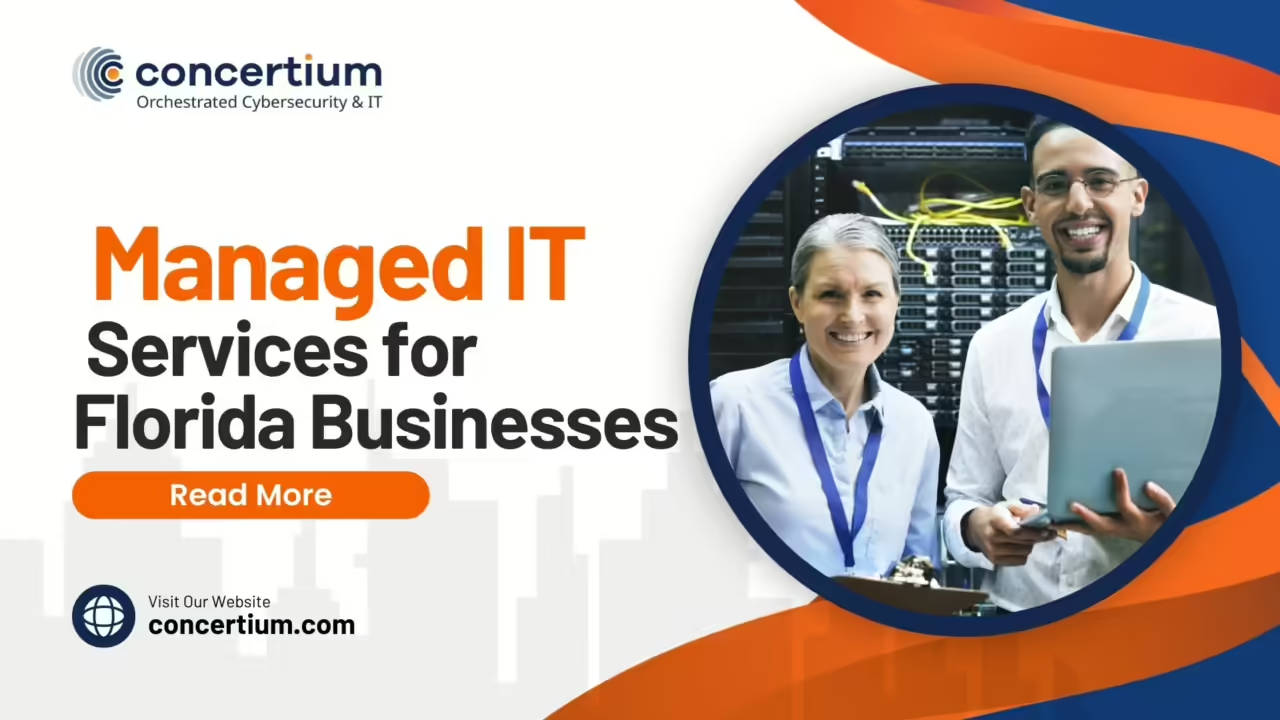Managed IT Services for Florida
Managed IT services involve the proactive management of an organization’s IT infrastructure and end-user systems by an external provider. These services are essential for ensuring the seamless operation of business technology and maintaining robust cybersecurity measures. Over the past decade, the managed IT services industry has seen significant growth due to the increasing reliance on technology in business operations. According to recent market reports, the global managed services market is expected to reach $350 billion by 2026, driven by the need for enhanced IT security, improved operational efficiency, and cost reduction.
This article aims to highlight the significant benefits of managed IT services for businesses in Florida. By understanding these advantages, businesses can make informed decisions about integrating managed IT services into their operations. The article will also provide insights into the different types of managed IT services and the critical role played by managed service providers (MSPs).
Understanding Managed IT Services
What are Managed IT Services?
Managed IT services refer to the comprehensive outsourcing of IT management and support to an external provider. This approach allows businesses to focus on their core operations while the managed service provider (MSP) handles the IT infrastructure.
Managed IT services encompass a wide range of offerings, including network management, cybersecurity, cloud services, and IT support. The scope of these services can be tailored to meet the specific needs of each business, providing flexibility and scalability.
Key Components
- Support Services
- Round-the-clock IT support and helpdesk services to resolve technical issues promptly.
- Regular maintenance and updates to ensure systems are running efficiently.
- Security Services
- Proactive monitoring and management of security threats.
- Implementation of robust cybersecurity measures to protect against data breaches and cyberattacks.
- Cloud Services
- Management of cloud infrastructure and applications.
- Support for cloud migration and integration of cloud-based solutions.
- Remote Monitoring and Management
- Continuous monitoring of IT systems to detect and address issues before they impact operations.
- Automated management tools to streamline IT processes and improve efficiency.
- Professional Services
- IT consulting and strategic planning to align technology with business goals.
- Implementation of new technologies and solutions to drive business growth.
Types of Managed IT Services
Managed Security Services
Managed security services focus on protecting an organization’s IT infrastructure from cyber threats. These services include:
- Cybersecurity Measures
- Implementation of firewalls, intrusion detection systems, and antivirus software.
- Regular security audits and vulnerability assessments to identify and mitigate risks.
- Security Services and Protocols
- Development and enforcement of security policies and procedures.
- Employee training programs to raise awareness about cybersecurity best practices.
Managed Network Services
Managed network services ensure the reliable and secure operation of an organization’s network infrastructure. Key aspects include:
- Infrastructure Management
- Design, implementation, and maintenance of network architecture.
- Management of network hardware, such as routers, switches, and firewalls.
- Network Monitoring and Support
- Continuous monitoring of network performance to detect and resolve issues.
- Remote and on-site support to address network-related problems.
Managed Cloud Services
Managed cloud services help businesses leverage cloud technology to enhance their operations. These services include:
- Cloud Service Models
- Management of Infrastructure as a Service (IaaS), Platform as a Service (PaaS), and Software as a Service (SaaS) solutions.
- Support for hybrid cloud environments that combine on-premises and cloud-based resources.
- Cloud-based Services and Benefits
- Scalability and flexibility to adjust resources based on business needs.
- Cost savings through reduced hardware and maintenance expenses.
Managed Print Services
Managed print services optimize an organization’s printing environment to reduce costs and improve efficiency. Key benefits include:
- Print Management
- Centralized management of all printing devices and workflows.
- Implementation of print policies to control and reduce print-related expenses.
- Cost Savings and Efficiency
- Reduced paper and toner usage through efficient print management.
- Enhanced productivity by minimizing downtime and maintenance issues.
Role of Managed Service Providers (MSP)
Managed service providers (MSPs) are external companies that deliver a range of IT services to businesses. These providers take on the responsibility of managing and maintaining IT infrastructure, allowing businesses to focus on their core activities. MSPs offer expertise, resources, and technologies that might be too costly or complex for businesses to manage in-house.
Types of MSPs
- Application Service Providers
- Offer software applications and related services over the internet.
- Provide support and maintenance for these applications.
- Cloud Service Providers
- Deliver cloud computing services, including storage, processing, and software solutions.
- Manage cloud infrastructure and ensure its security and performance.
Services Offered by MSPs
- Wide Range of Services
- Comprehensive IT management, including network, security, cloud, and support services.
- Customized solutions to meet the unique needs of different businesses.
- Customized Solutions for Businesses
- Tailored service packages based on the specific requirements of each business.
- Flexible pricing models to accommodate different budgets and business sizes.
Benefits of Managed IT Services for Florida Businesses
Enhanced Security
Managed IT services provide comprehensive security solutions that protect businesses from various cyber threats. These solutions include:
- Managed Security Services
- Continuous monitoring and management of security systems to detect and respond to threats.
- Implementation of advanced security technologies to safeguard data and networks.
- Proactive Threat Detection and Response
- Early identification of potential security threats through advanced monitoring tools.
- Swift response and mitigation of threats to minimize impact on business operations.
Managed IT service providers also implement robust cybersecurity measures to ensure the safety of business data and systems.
- Data Protection and Compliance
- Encryption of sensitive data to prevent unauthorized access.
- Compliance with industry standards and regulations, such as GDPR and HIPAA.
- Security Services Tailored to Business Needs
- Custom security solutions based on the specific risks and requirements of each business.
- Regular updates and patches to protect against emerging threats.
Cost Efficiency
Managed IT services offer predictable pricing models that help businesses manage their IT budgets more effectively.
- Cost-saving Strategies
- Reduction in hardware and software costs through managed services.
- Elimination of unexpected expenses related to IT issues and repairs.
- Financial Benefits for Small and Medium-sized Businesses
- Affordable access to enterprise-level IT services and expertise.
- Improved financial planning and resource allocation.
Managed IT services optimize the use of IT resources, leading to increased efficiency and productivity.
- Efficient Use of IT Resources
- Streamlined IT operations through automation and proactive management.
- Better allocation of IT resources to strategic initiatives rather than routine maintenance.
- Reduction in Operational Costs
- Lowered operational costs through efficient IT management and support.
- Savings on energy and maintenance expenses due to optimized IT infrastructure.
Access to Expertise
Managed IT service providers offer access to a team of skilled IT professionals with expertise in various areas.
- Expertise of Managed IT Service Providers
- Highly trained and certified IT specialists with extensive experience.
- Access to the latest technologies and industry best practices.
- Specialized Skills and Knowledge
- Expertise in areas such as cybersecurity, network management, and cloud computing.
- Continuous training and development to stay updated with industry trends.
Managed IT services ensure continuous monitoring and management of IT systems to maintain optimal performance.
- 24/7 Support Services
- Around-the-clock support to address IT issues promptly and minimize downtime.
- Proactive monitoring to detect and resolve potential problems before they impact operations.
- Remote Monitoring and Management
- Remote access to IT systems for efficient management and troubleshooting.
- Use of advanced tools and technologies to monitor and manage IT infrastructure.
Scalability and Flexibility
Managed IT services provide adaptable solutions that can scale with the growth of the business.
- Services Tailored to Business Growth
- Flexible service offerings that can be adjusted based on changing business needs.
- Scalable IT solutions that support business expansion and new initiatives.
- Flexibility in Service Offerings
- Customizable service packages that cater to specific business requirements.
- Options to add or remove services as needed without significant disruptions.
Managed IT services ensure effective management of IT infrastructure and applications.
- Scalable Infrastructure Services
- Scalable infrastructure solutions that support business growth and changing needs.
- Efficient management of IT assets to optimize performance and reduce costs.
- Managed Application Services
- Comprehensive management of business applications to ensure smooth operation.
- Support for application updates, security, and performance optimization.
Focus on Core Business Functions
Outsourcing IT tasks to managed service providers allows businesses to concentrate on their core competencies. By delegating IT management to experts, companies can ensure their IT systems are handled efficiently while they focus on strategic growth and development.
- Importance of Outsourcing
- Reduces the burden of managing complex IT infrastructure.
- Frees up internal resources for more critical business functions.
- How Outsourcing IT Tasks Allows Focus on Core Business
- Enables employees to dedicate more time to core activities rather than IT issues.
- Improves overall productivity and efficiency across the organization.
Managed IT services contribute to the improvement of business processes by streamlining operations and implementing best practices.
- Streamlining Operations
- Automating routine IT tasks to enhance efficiency.
- Implementing standardized processes to reduce errors and inconsistencies.
- Enhancing Business Goals and Objectives
- Aligning IT strategies with business goals to drive growth.
- Providing insights and recommendations to optimize business processes.
Strategic IT Planning
A well-defined IT strategy is crucial for long-term business success. Managed IT service providers assist businesses in developing and implementing strategic IT plans that align with their goals and objectives.
- Importance of Strategic Planning
- Ensures IT initiatives support business growth and competitiveness.
- Provides a roadmap for future technology investments and improvements.
- How MSPs Assist in Strategic IT Planning
- Offering expert advice and guidance on IT trends and innovations.
- Helping businesses identify and prioritize IT projects that deliver the most value.
Managed IT service providers offer technology services and consulting to help businesses navigate the ever-evolving IT landscape.
- IT Strategy Consulting
- Assessing current IT infrastructure and identifying areas for improvement.
- Developing comprehensive IT strategies that address business needs.
- Benefits of Consulting Services for Business Growth
- Access to specialized knowledge and expertise.
- Enhanced decision-making through data-driven insights and recommendations.
Challenges and Considerations in Managed IT Services
Common Challenges
Managing relationships with multiple service providers can be challenging for businesses. Effective vendor management is essential to ensure the quality and reliability of services.
- Managing Multiple Service Providers
- Coordinating and overseeing the performance of various providers.
- Ensuring all services are integrated and aligned with business objectives.
- Ensuring Service Quality and Reliability
- Regularly evaluating vendor performance and service delivery.
- Establishing clear communication channels and service level agreements (SLAs).
Integrating managed services with existing IT infrastructure can pose challenges. It’s essential to address compatibility and integration issues to ensure a seamless transition.
- Integrating Managed Services with Existing Infrastructure
- Assessing the compatibility of new services with current systems.
- Planning and executing integration strategies to minimize disruptions.
- Overcoming Compatibility Challenges
- Utilizing integration tools and technologies to bridge gaps.
- Working closely with MSPs to ensure successful integration.
Choosing the Right Managed Service Provider (MSP)
Selecting the right managed service provider is crucial for the success of managed IT services. Businesses should evaluate potential providers based on several key factors.
- Key Factors to Consider
- Experience and expertise in the industry. Service provider may also provide you certifications and legal documentations.
- Range of services offered and their relevance to business needs.
- Reputation and customer reviews.
- Evaluating Service Offerings and Expertise
- Assessing the provider’s ability to deliver high-quality services.
- Ensuring the provider has the necessary skills and resources to meet business requirements.
Understanding and negotiating the terms of the service agreement is vital to ensure a successful partnership with an MSP.
- Understanding Service Agreements
- Reviewing the scope of services, pricing, and contract terms.
- Ensuring clarity on responsibilities, deliverables, and SLAs.
- Negotiating Terms and Conditions
- Discussing and agreeing on service levels, response times, and penalties for non-performance.
- Ensuring the agreement aligns with business objectives and expectations.
Implementing Managed IT Services
The implementation of managed IT services involves several steps to ensure a smooth and successful transition.
- Step-by-step Guide to Implementation
- Assessing current IT infrastructure and identifying needs.
- Selecting the right MSP and finalizing the service agreement.
- Planning the transition and integration process.
- Implementing the services and conducting thorough testing.
- Providing training and support to staff.
- Best Practices for Successful Adoption
- Establishing clear goals and objectives for the implementation.
- Maintaining open communication with the MSP and internal teams.
- Continuously monitoring progress and making necessary adjustments.
Ongoing monitoring and evaluation of managed IT services are essential to ensure they continue to meet business needs and deliver value.
- Ongoing Monitoring and Performance Assessment
- Regularly reviewing service performance and identifying areas for improvement.
- Using performance metrics and KPIs to measure success.
- Continuous Improvement and Feedback
- Gathering feedback from users and stakeholders to identify issues and opportunities.
- Working with the MSP to implement improvements and enhancements.
What People May Also Ask
What are the different types of managed IT services?
Managed IT services encompass a variety of offerings, including managed security services, managed network services, managed cloud services, managed print services, and more. Each type addresses specific aspects of IT management and support.
How do managed IT services benefit small and medium-sized businesses?
Managed IT services provide numerous benefits to small and medium-sized businesses, such as cost savings, access to expertise, enhanced security, scalability, and the ability to focus on core business functions.
What should I look for in a managed service provider?
When selecting a managed service provider, consider factors such as their experience, range of services, reputation, customer reviews, and ability to meet your business needs. It’s also important to evaluate their service agreements and ensure they align with your objectives.
How do managed IT services improve cybersecurity?
Managed IT services enhance cybersecurity by providing proactive threat detection and response, implementing robust security measures, conducting regular security audits, and ensuring compliance with industry standards and regulations.
What are the costs associated with managed IT services?
The costs of managed IT services can vary based on the scope of services, the size of the business, and the provider’s pricing model. Many MSPs offer predictable pricing models, such as fixed monthly fees, which help businesses manage their IT budgets effectively.
How do managed IT services support cloud-based operations?
Managed IT services support cloud-based operations by managing cloud infrastructure, ensuring data security, providing support for cloud migration, and optimizing cloud resources to meet business needs.
Conclusion
Managed IT services offer numerous advantages to businesses, including enhanced security, cost efficiency, access to expertise, scalability, and the ability to focus on core business functions. By leveraging these services, businesses can improve their IT operations and achieve their strategic goals.
Consider integrating managed IT services into your business operations to reap the benefits discussed in this article. For further assistance and consultation, contact our team of experts who can help you identify and implement the best managed IT solutions for your business needs.





